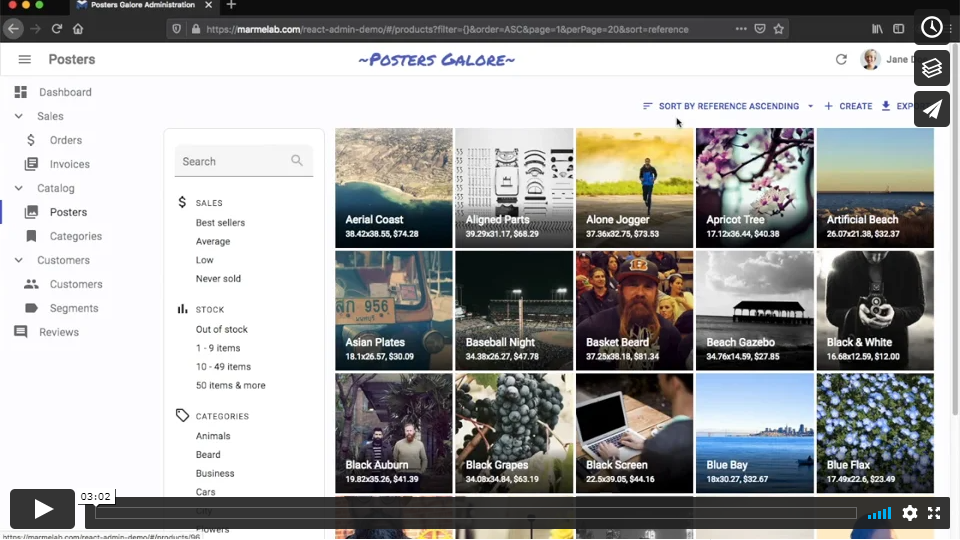ra-data-fakerest
v5.4.3
Published
JSON Server data provider for react-admin
Downloads
26,408
Readme
FakeRest Data Provider For React-Admin
Client-side data provider for react-admin, the frontend framework for building admin applications on top of REST/GraphQL services.
This package takes a JSON object as input, then creates a client-side data provider around it - no backend involved. The provider issues no HTTP requests, every operation happens locally in the browser. It's ideal to run e2e tests without an API server, or to showcase an admin only with a static server.
All operations carried out in react-admin are local to the browser, and last only for the current browser session. A browser refresh erases all modifications.
Installation
npm install --save ra-data-fakerestUsage
Pass a JSON object to the provider constructor:
// in src/App.js
import * as React from "react";
import { Admin, Resource } from 'react-admin';
import fakeDataProvider from 'ra-data-fakerest';
const dataProvider = fakeDataProvider({
posts: [
{ id: 0, title: 'Hello, world!' },
{ id: 1, title: 'FooBar' },
],
comments: [
{ id: 0, post_id: 0, author: 'John Doe', body: 'Sensational!' },
{ id: 1, post_id: 0, author: 'Jane Doe', body: 'I agree' },
],
})
import { PostList } from './posts';
const App = () => (
<Admin dataProvider={dataProvider}>
<Resource name="posts" list={PostList} />
</Admin>
);
export default App;Additionally, you can turn on console logging of fake requests by passing true as second parameter of the constructor.
Input Format
The main parameter must be an object literal with one key for each resource type. Values are arrays of resources. Resources must be object literals with at least an id key.
Foreign keys are also supported: just name the field {related_resource_name}_id and give an existing value.
Here is an example input:
{
"posts": [
{ "id": 0, "title": "Hello, world!" },
{ "id": 1, "title": "FooBar" }
],
"comments": [
{ "id": 0, "post_id": 0, "author": "John Doe", "body": "Sensational!" },
{ "id": 1, "post_id": 0, "author": "Jane Doe", "body": "I agree" }
]
}You can find a more sophisticated example in the Posters Galore demo.
Logging
Pass true as second argument to log the requests made to the provider in the console. This is very helpful to debug the requests made by an app using this data provider.
// in src/App.js
import * as React from "react";
import { Admin, Resource } from 'react-admin';
import fakeDataProvider from 'ra-data-fakerest';
const dataProvider = fakeDataProvider({ /* data here */ }, true);
const App = () => (
<Admin dataProvider={dataProvider}>
// ...
</Admin>
);Delay
You can pass a delay in milliseconds as the third argument to the constructor. This will simulate a network delay for each request.
// in src/App.js
import * as React from "react";
import { Admin, Resource } from 'react-admin';
import fakeDataProvider from 'ra-data-fakerest';
const dataProvider = fakeDataProvider({ /* data here */ }, false, 1000);
const App = () => (
<Admin dataProvider={dataProvider}>
// ...
</Admin>
);Inspecting the Data
ra-data-fakerest makes its internal database accessible in the global scope under the _database key. You can use it to inspect the data in your browser console.
_database.getOne('posts', 1);
// { id: 1, title: 'FooBar' }Features
This data provider uses FakeRest under the hood. That means that it offers the same features:
- pagination
- sorting
- filtering by column
- filtering by the
qfull-text search - filtering numbers and dates greater or less than a value
- embedding related resources
Embedding
ra-data-fakerest supports Embedded Relationships. Use the meta.embed query parameter to specify the relationships that you want to embed.
dataProvider.getOne('posts', { id: 1, meta: { embed: ['author'] } });
// {
// data: { id: 1, title: 'FooBar', author: { id: 1, name: 'John Doe' } },
// }You can embed more than one related record, so the embed value must be an array. The name of the embedded resource must be singular for a many-to-one relationship, and plural for a one-to-many relationship.
{ meta: { embed: ['author', 'comments'] } }You can leverage this feature in page components to avoid multiple requests to the data provider:
const PostList = () => (
<List queryOptions={{ meta: { embed: ['author'] } }}>
<Datagrid>
<TextField source="title" />
<TextField source="author.name" />
</Datagrid>
</List>
);Embedding Relationships is supported in getList, getOne, getMany, and getManyReference queries.
Prefetching
ra-data-fakerest also supports Prefetching Relationships to pre-populate the query cache with related resources. Use the meta.prefetch query parameter to specify the relationships that you want to prefetch.
dataProvider.getOne('posts', { id: 1, meta: { prefetch: ['author'] } });
// {
// data: { id: 1, title: 'FooBar', author_id: 1 },
// meta: {
// prefetched: {
// authors: [{ id: 1, name: 'John Doe' }]
// }
// }
// }Prefetching is useful to avoid additional requests when rendering a list of resources with related resources using a <ReferenceField> component:
const PostList = () => (
<List queryOptions={{ meta: { prefetch: ['author'] } }}>
<Datagrid>
<TextField source="title" />
{/** renders without an additional request */}
<ReferenceField source="author_id" />
</Datagrid>
</List>
);Prefetching Relationships is supported in getList, getOne, getMany, and getManyReference queries.
License
This data provider is licensed under the MIT License, and sponsored by marmelab.

